The Sentinela Program is a government social assistance program aimed at assisting children and adolescents who are victims of violence, whether within or outside the family, in the following forms: sexual, physical, psychological and neglect; sexual abuse being the most reported.
Implemented in the city of Itaboraí (RJ) since 2001, the program has already received approximately 350 cases of violence and provided more than 10,000 social, psychological and educational services.
Sentinela represented a “watershed” in the history of combating violence in the city, since previously only the Guardianship Council and the Children and Youth Court had addressed this demand; there were no programs to provide psychosocial support. Therefore, these cases were not considered in their real needs (special protection), since all aspects involving violence against children and adolescents were not discussed in forums, councils or with the family itself. Sentinela has provided a new way of thinking about the social, psychological and cultural issues that permeate and sustain the cycles of violence present in homes and on the streets.
With an interdisciplinary team and intersectoral actions based on the three types of violence prevention (primary, secondary and tertiary), Sentinela aims to reduce the rates of violence against children and adolescents in our city. The activities developed include individual and group care for families; home and institutional visits; workshops and lectures for the network; team meetings; participation in councils, committees and forums. All efforts are focused on coordination with the network and team training, aiming to efficiently meet all the needs of children and adolescents, as well as their families.
Based on the Child and Adolescent Statute (Law 8.069/1990) and on the municipal, state and national plans to Combat Sexual Violence against Children and Adolescents, we strive to ensure specialized and quality care. However, we encounter difficulties, such as the silence of families and communities regarding reporting cases of abuse. Therefore, in order to help end the silence and raise awareness in society about this problem, we conducted a sample survey with health and education professionals in the municipality in order to find out how much information they had about the problem.
In the responses obtained (39 questionnaires), 56.41% of education professionals stated that they were familiar with the work developed by the Sentinela Program.
Regarding the strategies they use to address the issue of “violence in the school environment”, 78.94% said that informal conversations, lectures and seminars were the most frequent techniques.
97.4% of professionals responded that they were not aware of any cases of sexual exploitation. Regarding reporting, 61.76% said they reported the violence to the appropriate agencies and 60.86% made observations about changes in the behavior of the victimized child or adolescent; the others did not respond or reported not having problems related to violence.
Regarding the relationship with the Guardianship Council, 55.88% said they contacted it when necessary, while 44.11% said they did not contact it.
When asked if they had experienced or had experienced conflict situations with students, 72.22% said they had not. Regarding preventive activities with guardians and discussions about the Child and Adolescent Statute, approximately 60% stated that they developed actions aimed at these issues.
Finally, regarding the difficulties encountered in dealing with situations of violence at school, 54.16% pointed out the absence of guardians and protection agencies, as well as the lack of information from people; 45.83% focused on violence in the community and family(1).
In the interviews (29 health units) with Health Agents/Family Health Program (PSF), 89.65% stated that they were not aware of the work developed by the Sentinela Program. However, regarding the Guardianship Council, we detected some contradictions: although 37.93% stated that they report violence to the Guardianship Council, 75.86% denied having any relationship with it.
Despite 72.41% being aware of the Child and Adolescent Statute and 82.75% having participated in training, 68.96% reported fearing reporting, mainly because they live in the area where they work. Furthermore, 55.17% said they were unaware of cases of violence in the communities.
In the 28 interviews conducted with caregivers of children/adolescents in the pediatric ward of the Leal Jr. Municipal Hospital, 96.42% of the people were also unaware of the work developed by the Sentinela Program.
Regarding the way of raising children, 60.71% said that they prioritized dialogue as the best strategy. Regarding reporting, only one interviewee admitted that he had already been aware of a case of violence and did not report it; the remaining 92.85% would report it to an institution. However, when asked about any cases of violence in the community, 85.71% responded that they were unaware.
Most of the interviewees reported being familiar with the Child and Adolescent Statute and the Guardianship Council(1).
We intend to expand the research to other professionals and the general population, aiming to add to the information obtained other perspectives on the issue of violence against children and adolescents.
Going beyond the “institutional walls” is the key to combating violence against children and adolescents. This means working not only with the network within the municipality, but also going beyond the municipal territory, building partnerships with government and non-governmental organizations in all possible spaces, with professionals from different areas (social workers, psychologists, teachers, doctors, lawyers, etc.) working in academia and those who are involved in intervention practices. Councils, committees and forums are the places where there is a greater possibility of approaching the population for debate and elaboration of proposals.
Direct and continuous contact with the network makes it possible to increase the visibility of the phenomenon, which is still unknown or misinterpreted by the population and even by many professionals who deal directly with the issue. This is why activities such as lectures and workshops in schools, health clinics, churches and residents’ associations are important, as well as specialized training for technicians directly involved with the problem.
We highlight the work developed by the Municipal Commission for Combating Violence against Children and Adolescents. These issues include the need to set up a shelter (due to the existence of cases that require temporary shelter) and the fight for a space reserved for victims of violence at the Forensic Medical Institute (IML), which is already an achievement of the commission together with this agency and local authorities.
Other issues are addressed, such as the need to train the various professionals who work in the care of children and adolescents, and the reduction of the revictimization process, when the child is subjected to several occasions to report the violence suffered (Guardianship Council, IML, police station, etc.). There are also situations such as the corpus delicti and shelter, which reinforce the embarrassment of the child.
Data from the program reveal an increase in the number of reports of cases of violence. However, we know that these numbers are still below the reality, hence the importance of constant investments in actions to publicize the issue of violence among communities and their representatives.
The following figures refer to the records of the Sentinela Program since September 2001, the period of its implementation.
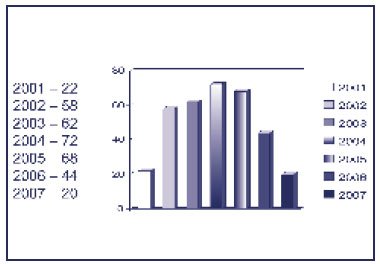
Figure 1 – Number of cases registered up to April 2007:346
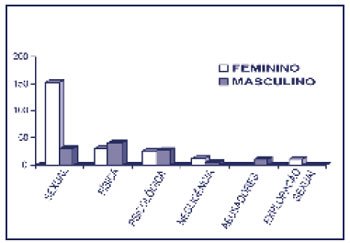
Figure 2 – Violence by gender
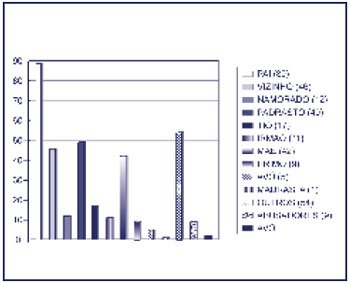
Figure 3 – Profile of aggressors

Figure 4 – Gender
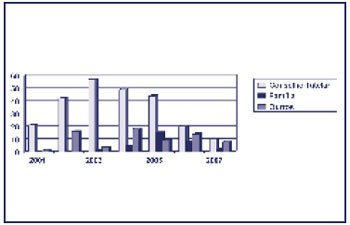
Figure 5 – Origin of referrals
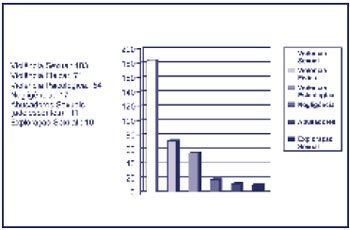
Figure 6 – Type of violence
 Figure 1 – Number of cases registered up to April 2007:346
Figure 1 – Number of cases registered up to April 2007:346 Figure 2 – Violence by gender
Figure 2 – Violence by gender Figure 3 – Profile of aggressors
Figure 3 – Profile of aggressors Figure 4 – Gender
Figure 4 – Gender Figure 5 – Origin of referrals
Figure 5 – Origin of referrals Figure 6 – Type of violence
Figure 6 – Type of violence